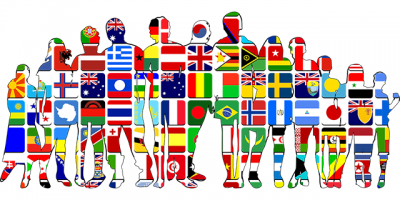
(Posted 2022 March)
 In the words of legal scholar and advocate Kimberle Crenshaw, intersectionality “is a lens through which you can see where power comes and collides, where it interlocks and intersects.” Intersectionality recognizes that we experience the world based on our unique individual identities and in the ways these identities intersect. Similarly, movements for social justice intersect because they often have similar and interrelated goals. To quote civil rights activist Audre Lorde, "There is no such thing as a single-issue struggle, because we do not live single-issue lives.”
In the words of legal scholar and advocate Kimberle Crenshaw, intersectionality “is a lens through which you can see where power comes and collides, where it interlocks and intersects.” Intersectionality recognizes that we experience the world based on our unique individual identities and in the ways these identities intersect. Similarly, movements for social justice intersect because they often have similar and interrelated goals. To quote civil rights activist Audre Lorde, "There is no such thing as a single-issue struggle, because we do not live single-issue lives.”
The movement to address sexual and domestic violence emerged from the movement for gender justice and was also closely associated with the movements for racial justice, economic justice, reproductive justice, and gay and trans liberation movements. Though inextricably intertwined with these other movements, activists elevated issues related to sexual and domestic violence separately because they recognized that systemic oppression impacts victims and survivors differently based on their identities.
Fairfax County’s Domestic and Sexual Violence Services recognizes intersectionality of victims, survivors, and those who cause harm. As part of its strategic plan, DSVS is re-evaluating its philosophical approach and assessing whether this approach has applicability to a diverse population of victims/survivors and those who cause harm, as it promotes client choice and self-determination, access to meaningful services, and the systems’ ability to build natural and community support and resiliency into the Coordinated Community Response (CCR).
Breaking Down Justice Movements
Systemic change requires understanding of how intersectionality impacts those with marginalized identities. The intersection of any marginalized identity increases the lifetime risk of gender-based violence, sexual violence, and domestic violence, but different identities impact survivors seeking support in different ways. These are some examples of why different justice movements are necessary to support all survivors:
- Racial Justice. In addition to experiencing violence at higher rates, the criminal justice system disproportionately criminalize and cause harm to victims who are Black, Indigenous, and people of color (BIPOC) when they seek help. Victims may be arrested, jailed, and even imprisoned due to being incorrectly identified as the perpetrator of violence or when they defend themselves. Additionally, the criminal justice system is more likely to give prison or jail sentences to people of color who perpetrate intimate partner violence as compared to their white counterparts, leaving their victims and families without access to financial support for extended periods of time.
- Economic Justice. The costs of mental and physical health care, legal representation, missed paid workdays, and sometimes complete loss of employment create significant economic burdens for victims of sexual and domestic violence. Housing discrimination, such as evicting a tenant or refusing to renew their lease due to domestic violence, is illegal; however, many survivors are discriminated against based on issues related to the violence, such as the police being called to their home.
- Reproductive Justice. Victims who do not have access to reproductive health care and education are at greater risk for unintended pregnancy and for contracting sexually transmitted infections (STIs), which can directly and indirectly impact their physical and mental health.
- Trans and Queer Liberation. LGBTQ victims may be afraid to tell anyone about the violence they experienced due to fear of being outed, which can both impact their relationships and lead to discrimination at work or school. Trans and gender nonconforming survivors are particularly likely to experience discrimination when seeking resources following victimization, including medical care, mental health care, housing, and employment.
How to Ally Yourself with Intersectional Justice Movements
- Listen to survivors whose experiences are different from your own, and practice cultural humility
- Recognize some resources may not be safe for all survivors, and previous negative experiences can lead survivors not to trust certain avenues of support
- Learn more about how survivors with marginalized identities experience sexual and domestic violence in specific ways related to those identities
This article was written by the DSVS Equity Team.
This article posting is part of the Domestic and Sexual Violence Services' Volunteer Voices monthly newsletter for current and potential volunteers. If you're not already a volunteer, learn how to get involved. Find out about upcoming trainings, volunteer trainings, happenings around the DSVS office and information about articles, books, media recommendations and more.
Learn more about the Domestic and Sexual Violence Services (DSVS).

